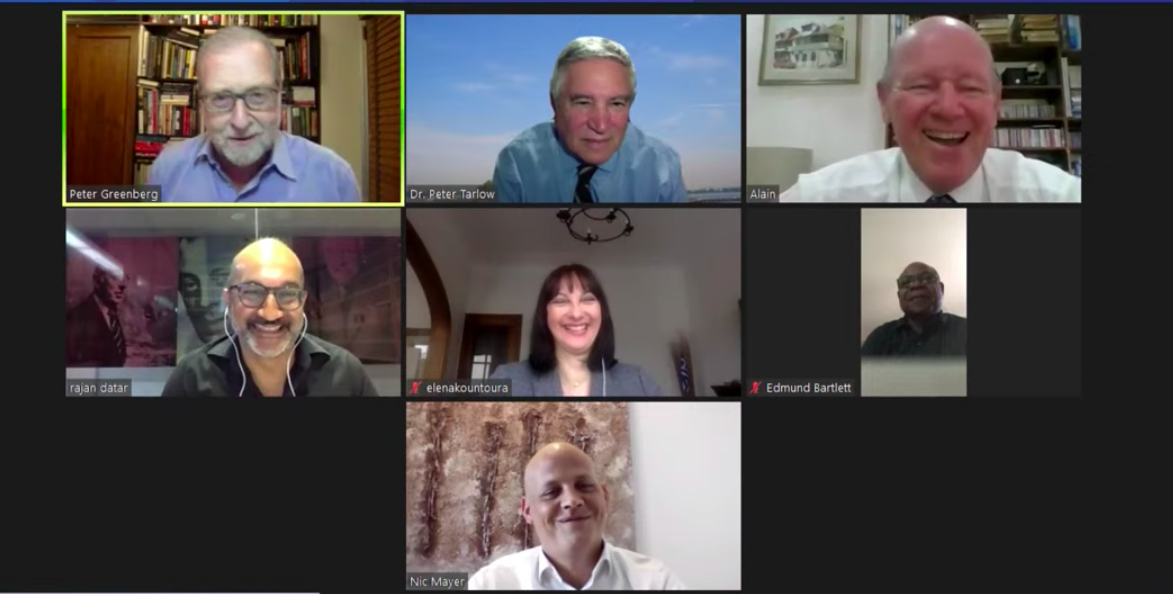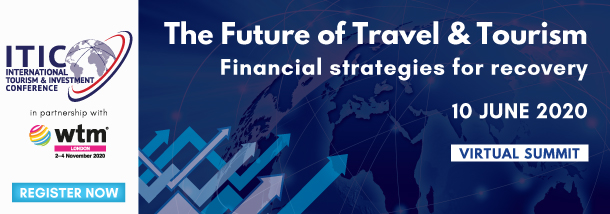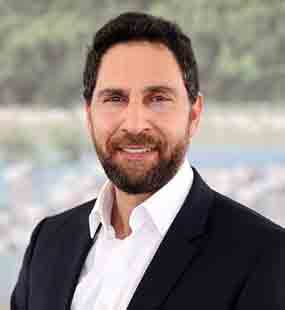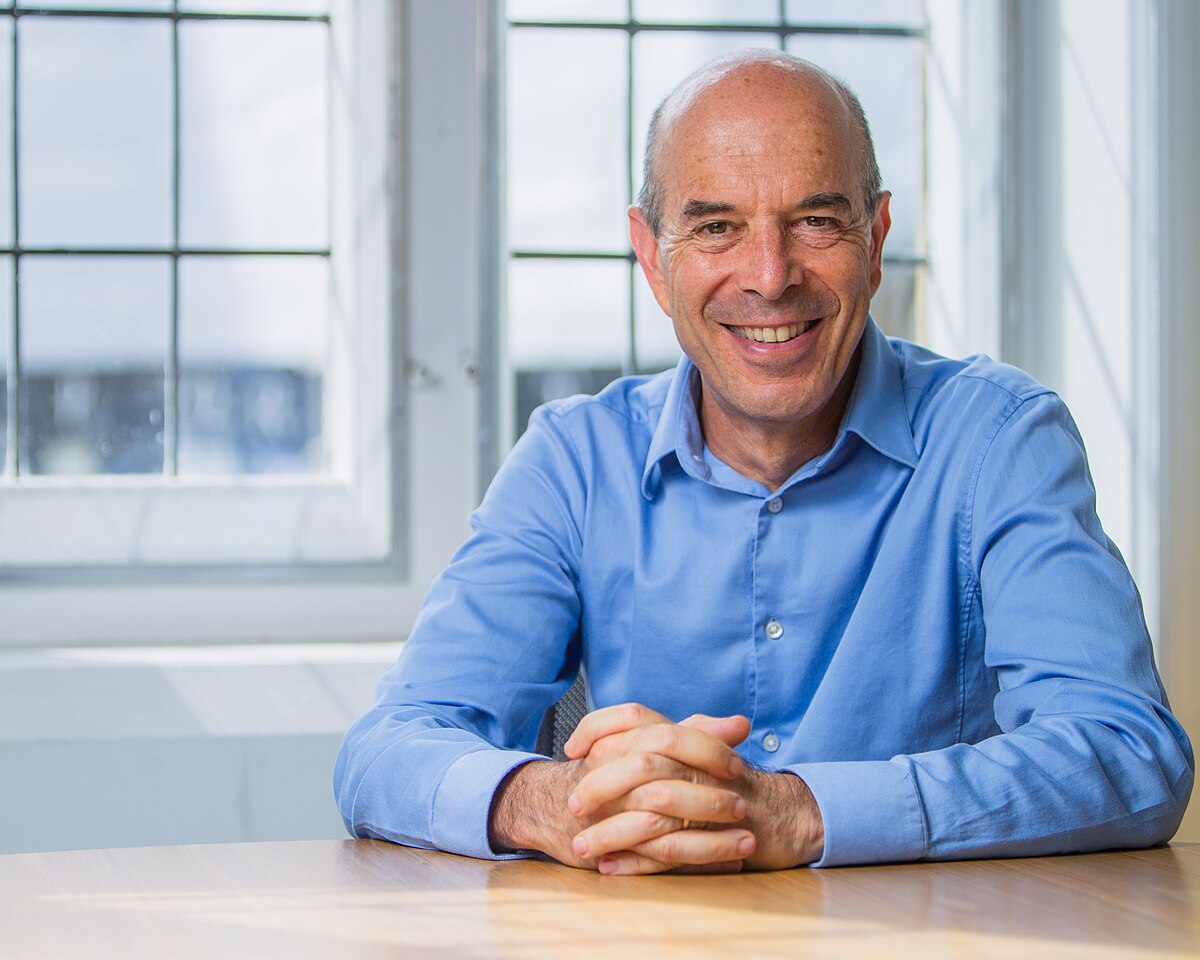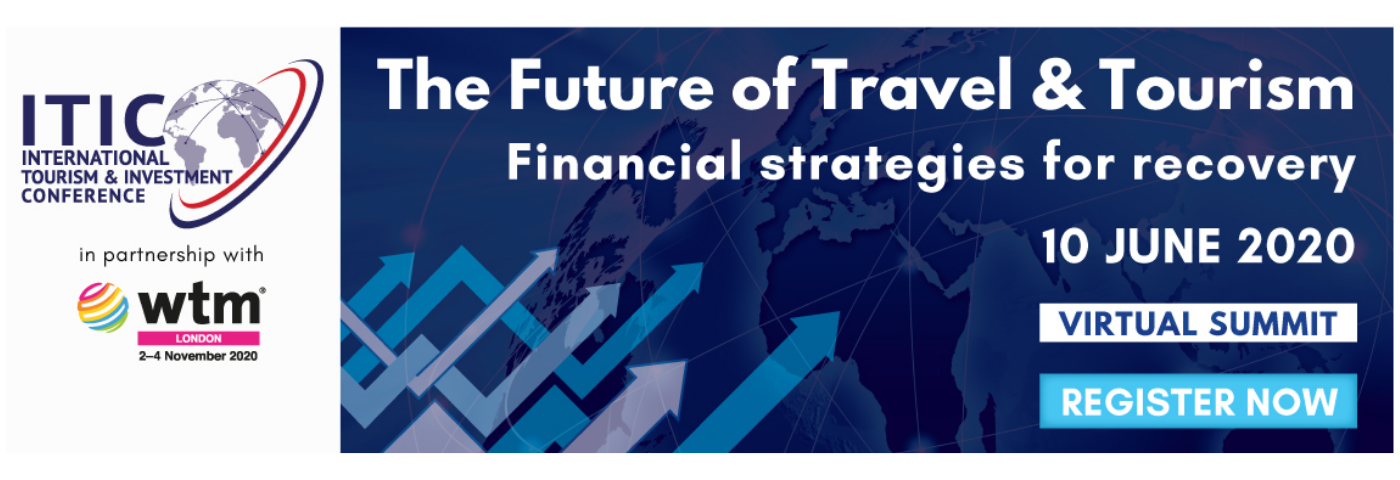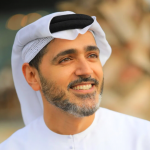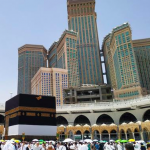Summit Review June 10, 2020
The Future of Travel & Tourism: Financial Strategies for the Recovery
YOU CAN WATCH THE FULL CONFERENCE BY CLICKING HERE
As the world slowly emerges from the worst of the pandemic, moves to resurrect travel and tourism faces hundreds of hurdles across the world in the pursuit of recovery.
Conference speakers and guests presented varying paths that the sector could pursue: from a completely new foundation that incorporates a closer relationship with green campaigners, to some who believed business travel is a key. Many speakers found comfort in the fact governments have now fully accepted the vital role travel and tourism play in the world economy.
But all speakers and guests were united in the belief that trust is vital if they are ever going to return to the levels of guests and travellers seen in 2019.
The Future of Travel & Tourism: Financial Strategies for the Recovery was the second virtual conference organised by ITIC, this time in partnership with WTM London.
It presented an ambitious five-hour programme and attracted delegates from around the world. Utilising a video conference system that promised delegates, simple log-in and the ability to watch not only from the ITIC web presentation but also live on YouTube or Facebook.
Key takeaways were:
- Technology and digitisation incorporation needs to be stepped up
- Securing the trust of travellers was essential
- Governments have now recognised the vital economic contribution of travel & tourism
- Now is a great time to invest, but chose you business carefully
- Vaccine or no vaccine, business must go on and it’s everyone’s responsibility to ensure safety
- Countries that have isolated themselves since the pandemic broke need to cooperate
- Big companies need to cooperate with the small
- Information and experience must be shared across the world
- No one supported quarantines, most supported improved testing
- Support differed over the idea of bubbles or corridors between nations
- Travel protocol and hygiene standards need to be the same worldwide
- Sustainability can be part of the post-pandemic sector
The summit opened with an introductory session led by the day’s main moderator Rajan Datar, BBC, BST, who introduced Dr Taleb Rifai, Chairman ITIC and former Secretary-General UNWTO; Simon Press, Senior Exhibition Director, WTM London and Ibrahim Ayoub, Group CEO & MD, ITIC LTD.
“Opportunity comes from all crisis and today is an opportunity to consider what the new world looks like,” said Dr Rifai. “Investment is very important and we have not realised how important. Psychologically the effect of investment is important and you can not underestimate its impact and sign of confidence.”
Jordanian and former UN World Trade Organisation Secretary-General Dr Rifai said – as he would repeat at the conclusion of the conference – that the world was lacking leadership in the restoration of confidence, that countries had become isolated while fighting the virus and the UN, the EU and even the USA had become less active on the world stage. He repeated his view that the November G20 conference may give opportunity to Saudi Arabia to offer the world a leadership in tourism direction. “The world after Covid will not be the same.”
Simon Press, Senior Exhibition Director at WTM London said the role of his organisation was to help rebuild by carrying on the connection it offers for business around the world. “WTM will continue to play a pivotal role,” he said.
ITIC’s Ibrahim Ayoub, CEO of the organisation said the future of travel and tourism is “all about getting investment”. “We have 1,250 people from 103 countries with us today,” he said. “ITIC has transferred its conference into this virtual format to respond to the new normal.”
Introduced by Rajan Datar, Mr Ayoub was described as “the brains behind the conferences, inspired by Dr Rifai, who is his mentor”.
The introductory session was titled Covid-19 has transformed our future. Where the travel and tourism sector stands now? with Gloria Guevara, President and CEO of WTTC.
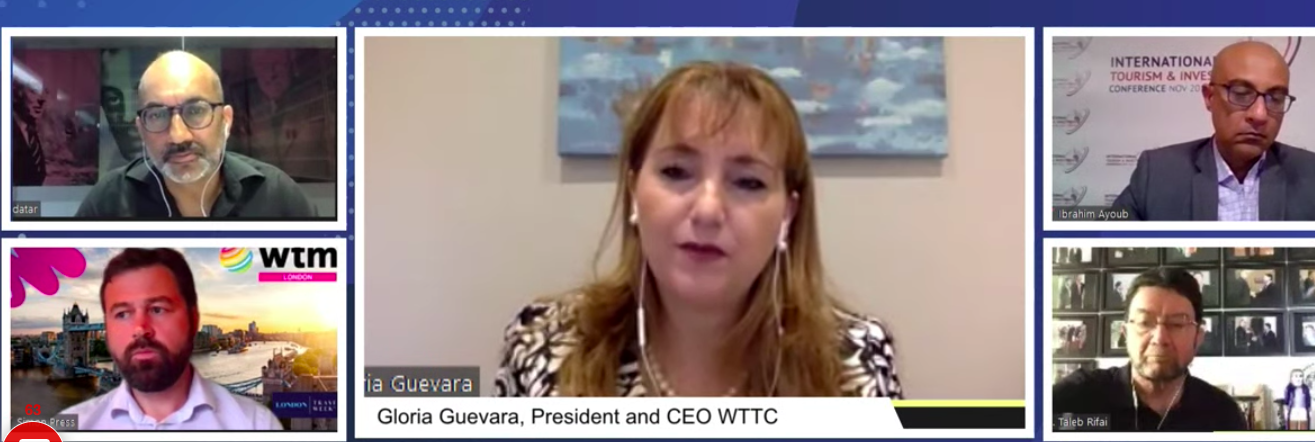
“What’s important is a coordinated approach between the private sector and governments,” said Ms Guevara. “The WTTC asked governments for three things: 1. Protect workers, 2. Help businesses in terms of liquidity and 3. Ensure fiscal benefits, so that businesses could pay workers, not be burdened by taxes.”
The WTTC is at the forefront of introducing the standards of safety and practices that will aid the recovery by inspiring trust in travellers and has already consulted with 150 governments. “We are no working towards the recovery,” she said. “Something like 9/11 took years to recover because each country worked in silos, with their own restriction – now 18 years later, protocols remain different. At some airports, do I take my shoes off or not?”
What she wants to see is ensure governments work together and “learn from each other”. “Protocols for travel need to be the same, all hotels have to be the same.” She says 80 countries have already agreed to the ‘Safe Stamp’ introduced by the WTTC so travellers will know and understand the procedures. She separated the future into two: before the vaccine and after the vaccine and said that during the ‘before’ people can not afford not to travel.
The WTTC is opposed to medical passports, which she fears will make travel more complicated. Testing is key but, referring to Ebola, SARS and MERS, she said that the sick were identified quickly and isolated – there has never been a vaccine for any of those viruses.
On Apps, she described them as “OK”. “But there may be documentation and we don’t want to see personal details online,” she said.
Domestic tourism would become a strong theme of the conference and Ms Guevara was full supportive saying it helps the recovery, preserves jobs and inspires trust. She was in favour of “bubbles” to allow tourism to thrive between selected countries – she highlighted New Zealand and Australia and the way European countries are looking cross border. “Every country will not recover at the same rate.”
Her view was not shared in some of the later session during the day, where the risk of excluding certain nations could cause long-term damage to individual countries.
And on the question of investment, Ms Guevara was sure there was no better time because recovery will definitely happen and “when it recovers, it will grow fast,” she said.
The 10am session was another scene setting presentation The current Global Economic Outlook and future investment perspectives, by Nicolas Mayer, PWC Industry Leader Hospitality and Tourism EMEA & Managing Partner Global Centre of Excellence Tourism & Hospitality.
He explained the pandemic was worse than any previous crisis as it had hit both the value chain and demand. “Different markets have been affected differently,” he said. He looked at China as an example saying it’s tourism sector had seen a V shaped dip in demand. “It’s recovery has been driven by a huge domestic market. But island destination are reliant on visitors – they are doomed to an either U-,or even, L-shaped recovery.
“Demand will come back very strongly, there is no reduction in the desire for travel ad no evidence of a drop,” he told the summit. “Finance needs to help companies ramp up to survive the valley of death when they reopen. The valley of death is the time they must survive when there’s a need to see cash out and the wait for cash to come in. In the hotel business this can be up to 150 days.”
He said very few have that sort of resource and he would like to see governments give support to businesses through that ‘valley of death’. But he said the burden and decision must be taken by the businesses themselves but also travellers should be expected to help – maybe pay up front, take some of the risk too in the short term so that that destination will survive for the future.
Mr Mayer agreed with Ms Guevara that despite the devastation to the sector caused by the virus, there are opportunities.
Following his presentation came the first panel discussion of the summit Why health protection is the key to recovery of the Travel & Tourism sector.
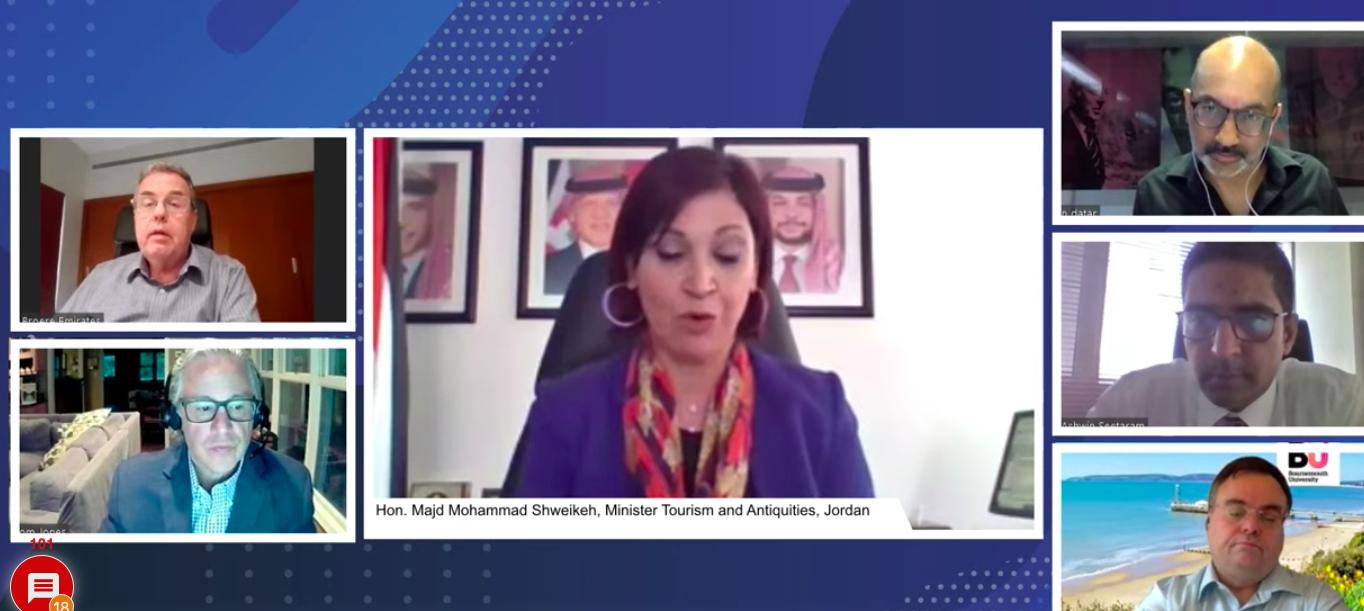
Tom Jones, Senior Partner, Healthcare, Finn Partners, talked about the necessity for collaboration to reduce anxiety, not only in guests and travellers but in the staff working in the industry as well. He praised the actions of governments in Mauritius and Jamaica, both island destinations with tourism at their heart, and both represented at the conference. He supported travel bubbles and said: “We need a vaccine and herd immunity.
He said health can be part of marketing: “Wellness is very important and consumers are aware of their own immune systems – so how do destinations make this an offering?”
Jordan has escaped the worst of the virus with only nine recorded deaths but it relies heavily on tourism and 2019 saw double digit growth according to Hon Majd Mohammad Shweikeh, Minister Tourism and Antiquities, Jordan.
She told the conference: “Initially all the tourism sector was in panic. But now we are having meetings to ensure survival and we will focus on niche tourism. We have green zones in the south, unaffected by the virus and while she agreed with moderator Mr Datar that somewhere like Petra, which is normally crowded, will have to change the way it operates. “But we will enhance the infrastructure and revise and reshape the journey for the customer. “That means a focus on health: hygiene, social distancing and masks.”
Emirates Airline has been a standard setter in the air travel market already. “Our programme is in place for the health and safety of staff and passengers in cooperation with the WTTC, said Rob Broere, VP-Industry Change, Emirates Airline & Chairman, IATA – Travel Standards Board. “We disinfect the aircraft every journey but we still provide gloves, masks and wipes to travellers. We have screens at check-in desks, waiting passengers can use only one in every three seats and hand baggage must be small to allow speedy boarding.”
On every Boeing 777 there is one person responsible for the toilet and it’s cleaned after every use.
He was strongly opposed to quarantine. “It makes no sense it will kill the business,” he said. “Consider a flight between Dubai and New Zealand. If there is no infection there is no point in imposing 14-day quarantine. The panel was largely dismissive of the UK’s proposal for 14-day quarantine, one member saying he’d be more worried about people from London than people arriving by aircraft. The UK has a higher daily-death rate than the whole of Europe currently with an estimated one in ten of all deaths occurring in the UK.
No matter what the risks remain, vaccine or no vaccine, people will travel said Prof Dimitrios Buhalis, Bournemouth University who is Director of the eTourism Lab and Deputy Director of the International Centre for Tourism & Hospitality Research. “They want to see places, they like going to nice places.”
But the success of the tourism industry was down to every single employee, he believes. “They will have to be responsible, we need to work together as well – the big operators Marriot, Emirates, IHG need to share and care, so that we all move forward together.”
As he had done before at the ATM-ITIC conference the previous week, he broke the leisure traveller market into four: “There is 25 per cent who are just away from things, the second 25 per cent lost money or income and can’t travel, then. Another quarter who are the smart travellers who will wait and see. And the fourth group I call the kamikaze, they will travel anywhere.”
Ashwin Seetaram is Director of Tourism, Ministry of Tourism, Mauritius, a country that has “been applauded for its response to the virus and success is eradicating it. But the Indian Ocean island has its own issues now with reintroducing tourism and travel. “We have lost 15 billion Mauritian rupees since our first case on March 19, compared to the same period last year,” he said.
But Mauritius has become the first island in the region to obtain a 100 per cent certificate for its protocols and health protections.
There was some consideration of the risks from smaller hotel and restaurant businesses, whether they would apply safety protocols as well as their chain counterparts and Prof Buhalis believed they would be safer. “Very often these family-run concerns also live on the premises. I worry about a five-star hotel waiter who then goes out. Small businesses will need better and accessible advice on operation.”
He has been advising Rhodes and Corfu on post-virus preparation and he would like to see big companies and operators ‘adopting’ small ones to ensure protocols are operated the same everywhere.
Jordan’s tourism minister though had some experience and they had seen small restaurant open and within a couple of days were behaving as they had before.
The panel was divided on the attractiveness of remote destinations. Some believed they could easily be promoted as safe and easy to visit. But Prof Buhalis said ‘safe’ is easy to say but he felt many visitors would see remote as “isolated from medical resource”. “It’s all about safety and everyone is responsible.”
The next session was titled Planning for the future: Understanding globalisation in the post Covid-19 world and the investment measures needed to boost recovery of the global travel and tourism industry.
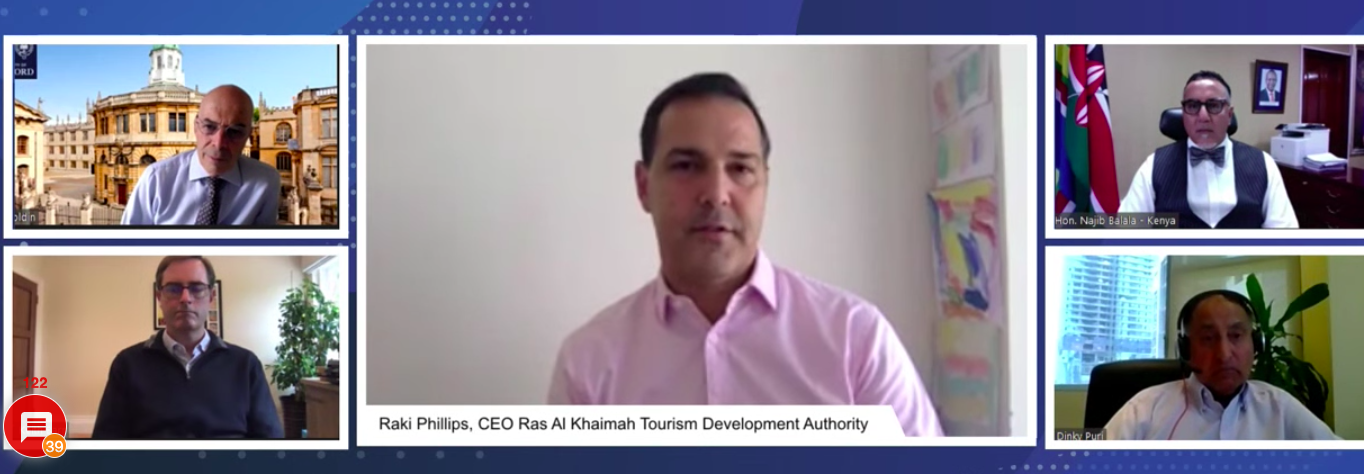
It was moderated by the man who predicted the economic devastation of this pandemic, five years ago in a book: Prof Ian Goldin, Professor of Globalisation and Development at the University of Oxford and the Director of the Oxford Martin Programme on Technological and Economics.
“Governments are only just realising the effects that the devastation to travel & tourism has on the wider economy,” said Hon. Najib Balala, Minister of Tourism, Kenya, which has seen fewer than 100 deaths in a population of 53 million. “After July we will start opening up but we do not have the resources of some nations.”
Keith Barr, is CEO InterContinental Hotel Group which has 5,600 said his operation had focused on how its 450 hotels in China had performed as a way of understanding how the rest of the world may emerge from the lockdown.
“We’ve focused on recovery and how we support our hotel owners and drive demand and that’s hygiene and cleanliness,” he said. “People want to travel but how do we make it safe?”
He revealed that some IHG resorts are ‘sold out’ – resorts in Vietnam and Florida. But he said that while they may be 100 per cent booked but social distancing and safety regulation put huge pressure on public spaces, bars, restaurants.
One of the United Arab Emirates smallest emirates is Ras Al Khaimah (RAK), 45 minutes from its glamorous sister emirate Dubai. But it has embraced domestic tourism, attracting guests from the other six emirates for short breaks and staycations. “The UAE relies heavily on tourism, worth 12 per cent of GDP and employing 750,000,” he said. “RAK’s two Ritz Carltons have been steadily bust since the pandemic. Cashflow is the big problem buy our staycation campaign aimed at domestic visitors for three nights, has resulted in 60 per cent occupancy at our hotels. We’re lucky, we have the space to ensure social distancing.”
Dinky Puri, CEO Eagle Wing Group, an integrated hospitality & real estate company located in UAE said the sector must not be “the policeman for governments…as costs will become problematic”. He forecast that it would be mid-2021 to 2022 before occupancy was back up: “So that we can ensure demand balances supply and we have the to retrain employees.”
And he was firm that 14-day quarantines “have to be reconsidered” to bring confidence back.
But his belief that business would drive the return of travel was disputed by moderator Prof Goldin who said: “I’ve been observing trends and I’m optimistic about travel & tourism, no two much about business but I agree with your 2022 recovery date.”
The panel as a whole were pretty much agreed that quarantine did nothing to help recovery and may actually achieve very little about tackling the spread which testing could achieve.
They also nodded agreement that continued restrictions may actually lead to greater problems. “In Africa I’m sure more people will died of hunger than Covid,” said Prof Goldin.
IHG’s CEO Mr Barr talked about technology and the way businesses use it to interact with customers. “How do we let customers know we’re open and safe?” He asked. “We need to take the costs out of operations for our owners. We need to more digitally interactive. We need to look at the stuff in rooms and remember our customers are digitally savvy.”
His call for cutting costs, “removing the fat”, was supported by Mr Puri who also said hotels should look at staff. “Empower people, if you work in the kitchen, would you like to step into the restaurant? Front office colleagues, perhaps you may manage the lounge – upgrade employees, empower people.”
This was followed by a 15-minute session Investment prospects in travel and tourism sector in the Kingdom of Saudi Arabia. His Royal Highness Prince Dr Abdulaziz Bin Nasser Bin Abdulaziz Al Saud, Chairman of Baseera Group and Mr Raed Habiss, Vice Chairman of Baseera group, CEO of RHH Consultancy and former Director of Tourism Investment of OIC in conversation with Dr. Taleb Rifai, Chairman of ITIC and former Secretary-General of UNWTO.
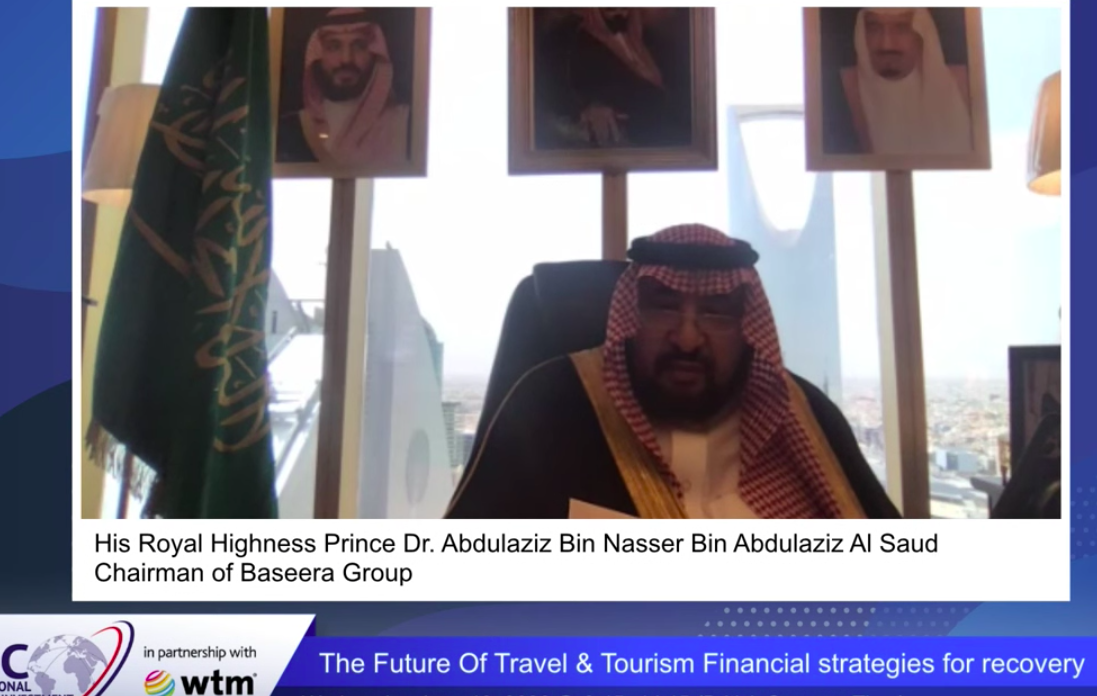
The Kingdom of Saudi Arabia began ambitious plans last October to earn 10 per cent of GDP and one million jobs by 2030. “KSA offers heritage and a civilisation going back 4,000 years said “ HRH Dr Abdulaziz Bin Nasser. His country has been transformed legacy in the past five years, visas are easier to obtain and it has declared itself open for foreign investment.
“We have reformed laws and regulation to attract investments, specifically allowing 100 per cent foreign ownership and set aside $450 billion to attract tourism investment.”
He was accompanied by “friend and business ally” Raed Habiss who reiterated the investment potential of his country and explained that far from being desert as many people imagine, it has green hills and mountains in the south where temperature can be in the 20s, compared with the summer highs of 55 degrees in the desert.
The next session dealt with preparation for any future pandemic or crisis Rethinking investments for better preparedness against potential future catastrophes moderated by Peter Greenberg of CBS News who opened with: “As a society we we want to travel – we need to travel. Cruise ships are at anchored there is a deep-seated fear. There’s a world recession, tourism could be in depression with 38 per cent job losses last month.”
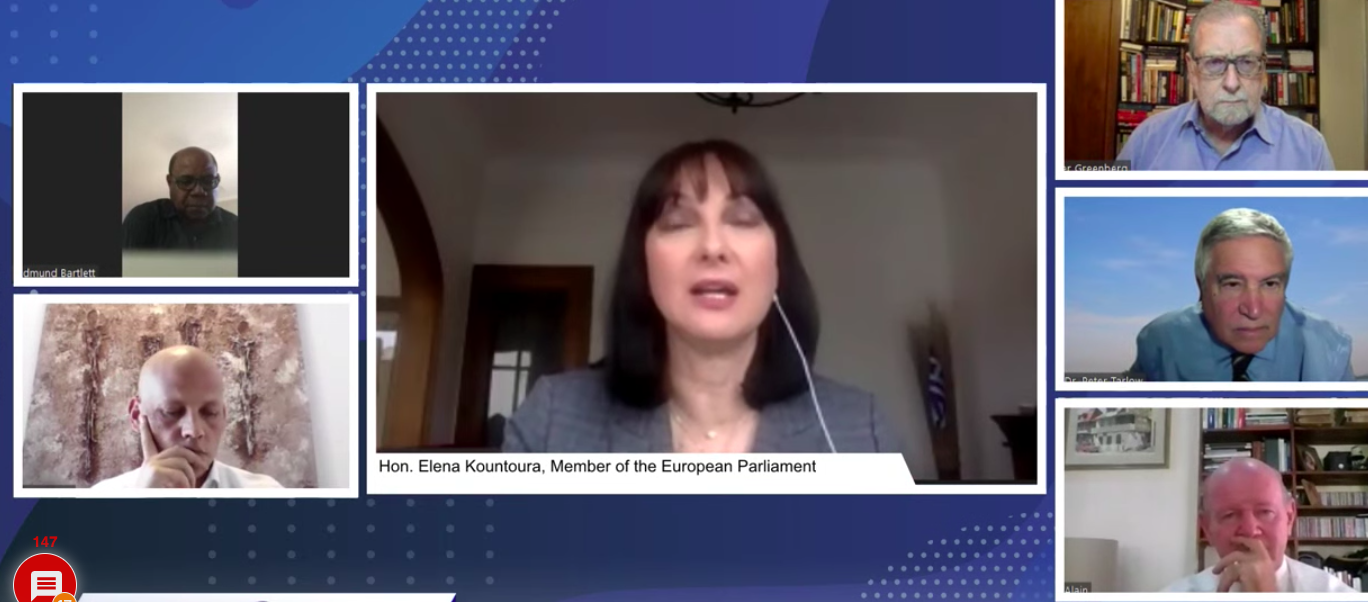
Nicolas Mayer, PWC Industry Leader Hospitality and Tourism EMEA & Managing Partner Global Centre of Excellence Tourism & Hospitality, who had presented earlier this time confirmed that there is no indication among surveys that people will not travel.
“But there is a need for government, finance and industry to get going again. But as an industry, we have not honed our skills in cashflow management, we’ve used to cut cost.”
He presented an optimistic view of the hospitality to those who fear widespread closures saying that the number of hotels that would survive the pandemic was “More than we might think”. Dealing with the insurance sector he said like finance, it will change and there will be a necessary sharing of risk among everyone as the sector moves forward. “There is no such thing as a risk-free ride.”
Hon Edmund Bartlett, Minister of Tourism Jamaica, admitted in his country the resource was “not there” to cushion events like this pandemic and he doubted that the industry could, as some call for, provide a protective fund of sufficient size.
“We need to build response mechanisms,” he said but appeared to agree with moderator Greenberg’s assertion that there was insufficient global leadership and that every country had had to “act on its own”.
Former Greek Minister of Tourism Elena Kountoura, now a Member of the European Parliament, said the way ahead was testing and ensure business stay alive to continue providing employment.
“I do worry how things will develop where its health provision versus restarting of the economy,” she said. “But it’s a good thing that the EU now takes travel and tourism much more seriously.”
In the isolated Seychelles its star was built on foreign tourists. But it has banned any ship from docking that has not been at sea for 14-days and it has banned lucrative cruise liners until 2022. Alain Saint Ange, President, Africa Tourism Board, tipped as a presidential candidate for the Seychelles, said it was an economic decision by the island. “The Seychelles is carrying out work on the port to improve cruise facilities and this was an opportune time,” he said. He also agreed that preparing for something of this size happening again was very difficult to finance.
Dr Peter Tarlow, President, Safer Tourism, poured cold water on expectations of a vaccine. “We have 12 different forms already, each would probably need a separate vaccine ,” he said. “Testing, in the same way, is not a panacea.
“We are at war and this is very important, like 1929, the Great Depression, there were good moves and bad. We can not use the public sector to buy ourselves out of this crisis through the redistribution of private money – this will cause an economic crisis to payback.”
PwC’s Mr Mayer also cautioned about the way travellers will pay and there will be fewer so it is up to the sector to work out ways to earn extra money, but offer more. “How do I get an extra five bucks? Can people stay an extra five days? At the top level, like the Seychelles, businesses are very good at this, but make customers ask how they can get better value.”
After a short break the conclusive session looked to summarise the day The Way Forward: ‘Foresights, initiatives and changing paradigms’.
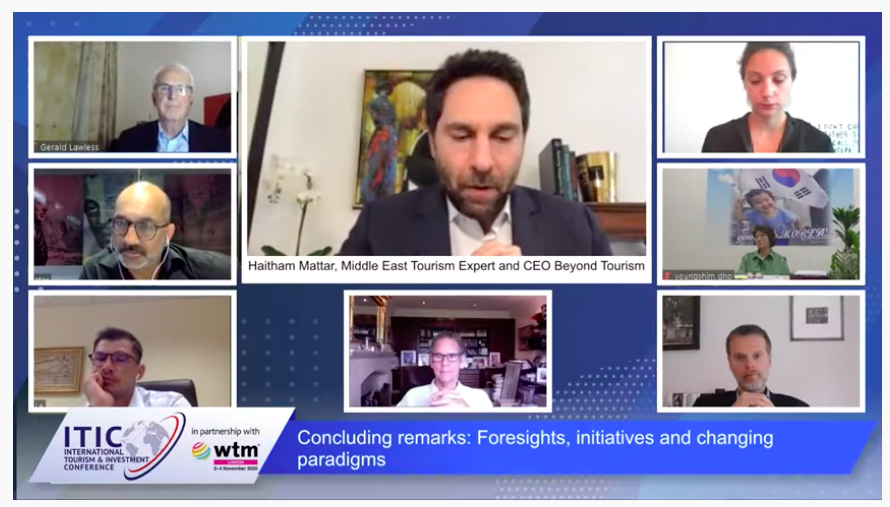
Gerald Lawless, WTTC Ambassador, Director ITIC & Advisory Board Member Dubai Expo 2020, took up the case for sustainable travel & tourism to be part of the solution.
“We have to convince the environmentalist that our industry does so much good for developing countries and we must understand the threats of climate change,” said Mr Lawless. “Aviation gets a bad press but creates less than 3 per cent of the pollution.
“Hotel groups did so well to get rid of single use plastics and Covid has brought them back.” He referred to the Republic of Ireland’s 2,100km West Coast project and how that had taken tourism to a region that benefited. On testing he was a huge supporter, praising the UAE where he has worked much of his life for its 2m tests out of a population of 9m.
And he singled out Germany with its attitude to ensuring tourism should be limited only within Europe for its people. “Why not the UAE?” asked Mr Lawless.
There were two presentations within the session, the first by Margaux Constantin, Partner at McKinsey Company looking at travellers intentions and travel searches online. She said travellers will spend money as soon as they are able this year, because they have the money, but as the recession bites in 2021 bookings will fall off and it may take until 2026 for recovery. She had used China’s domestic tourism recovery as an indicator for the rest of the world claiming there’s cause for optimism but it’s still 58 per cent down. “Mid-scale hotels are coming back the fastest but luxury is struggling,” she said.
Digitisation is vital, to cope with the increased number of bookings with a very short run in, as people do not want to book months in advance. And she argued urban centres will be the biggest losers, because of social distancing fears, and visitors will choose “outdoor locales”.
Gut even then she said people often say one thing and do another. In Las Vegas bookings are up 200 per cent. And cruises for 2021 are at 75 per cent as people have opted for rebooking rather than refunds on cruises this year.
The bed is the biggest cause for concern among travellers, not social distancing or queues but they want to know positively that it is safe.
The second presentation by Ben Lock, a PR professional and Senior Director, Edelman, focused on his company’s Trust Barometer – now in its 20th year. This year the focus has been different because of the pandemic but while people’s trust in government, media had been low, they had increased under Covid – especially the traditional media. He concluded companies must be “credible” and offer constant information to travellers in a “two-way” conversation with customers.
Christopher Rodrigues WTTC Ambassador said: “You will not take a love of tourism away. “ But he said prices should stay stable,” there is no evidence of price discounting yet, dumping product doesn’t work for them. Discount may get money but what people need is trust.”
When he was asked where he would invest his $1bn he said he’d invest in the suppliers to tourism. “I’d look at eco-tourism – I would not add to Costa hotels.”
Ambassador Dho Young-Shim, won praise for the reaction of her country South Korea, but she suggested it was down to the cultural mentality of the people being prepared to make sacrifice for the good of the greater public. That was why she said there was no law, just an instruction to wear masks and socially distance. She also suggested it was why contact app tracing did not provoke the resistance found in Europe.
“South Korean visitors are told if they have a medical problem of concern while visiting to dial 119, which brings an immediate hospital response,” she said.
Haitham Mattar, Middle East Tourism Expert and CEO Beyond Tourism who advises Saudi Arabia, took a pragmatic view to the suggestion that the Middle East had coped well with the virus and was well set to move forward. “The Middle East has big ambitions, but it has faced a crisis every year,” he said. “If something bad happens in Egypt, the UAE benefits, if Jordan is negatively affected, Lebanon benefits.” But ultimately he too agreed that trust was the key to future recovery.
The Bulgarian Minister of Tourism was taken ill on the day but her place was taken admirably by Todor Le, an advisor to the Ministry of Tourism in Bulgaria. “Tourism make up 20 per cent of GDP and we are focused on domestic first, which is 30 per cent of that, and Europe next year. Our beaches are open and we are working with neighbouring markets of Turkey, Greece and Croatia.”
Concluding Dr Rifai said it had been a great day. “Things will get worse before they get better but governments recognise travel and tourism is very important,” he said. “Countries have been left on their own to make bilateral agreements towards a new world order.
“Domestic tourism keeps the sector open preserving jobs and I believe that by travelling within their country, they will love it more. I believe a country should be enjoyed by its people first.”
WTM London Exhibition Director Mr Press thanked ITIC and pledged that November 2-4 2020 would be about getting back to business.
Mr Ayoub of ITIC congratulated and thanked all panelists and looked forward to October 30-31, Sustainable Investment Conference in London, and the Sustainable Conference in Bulgaria, September 2-4 .


